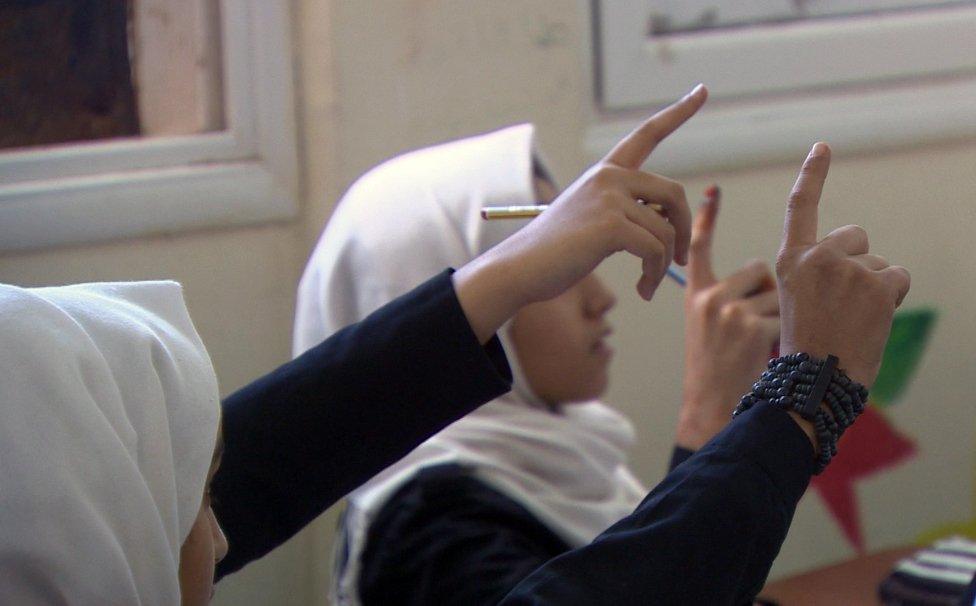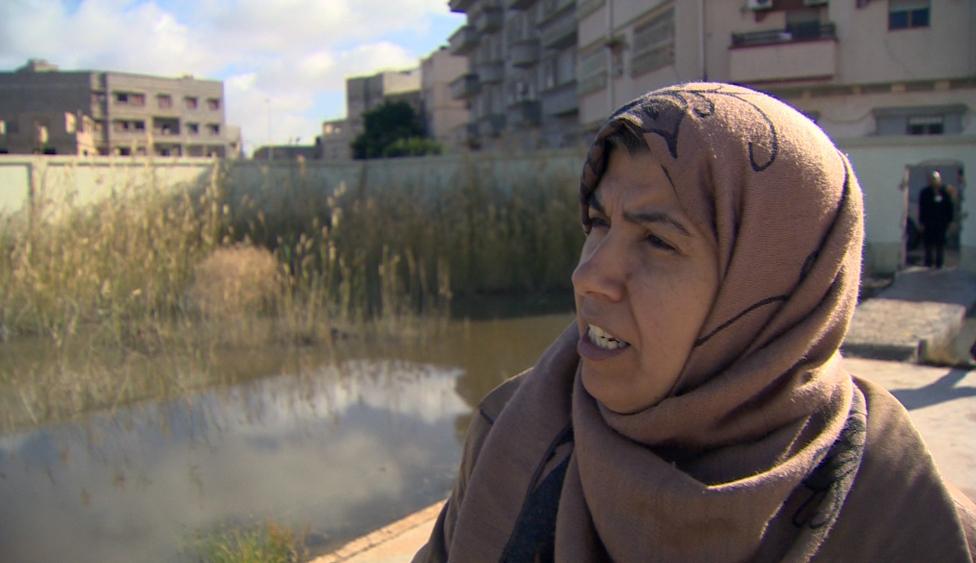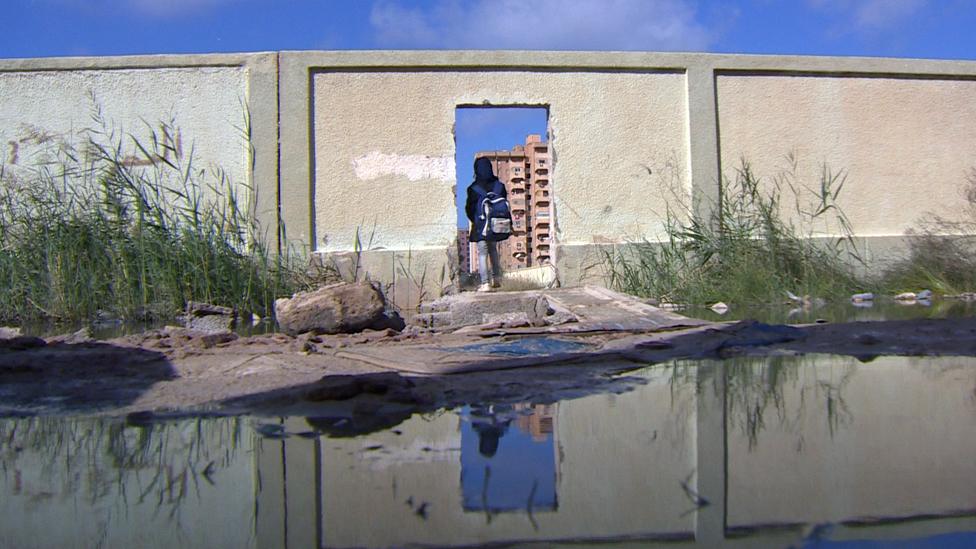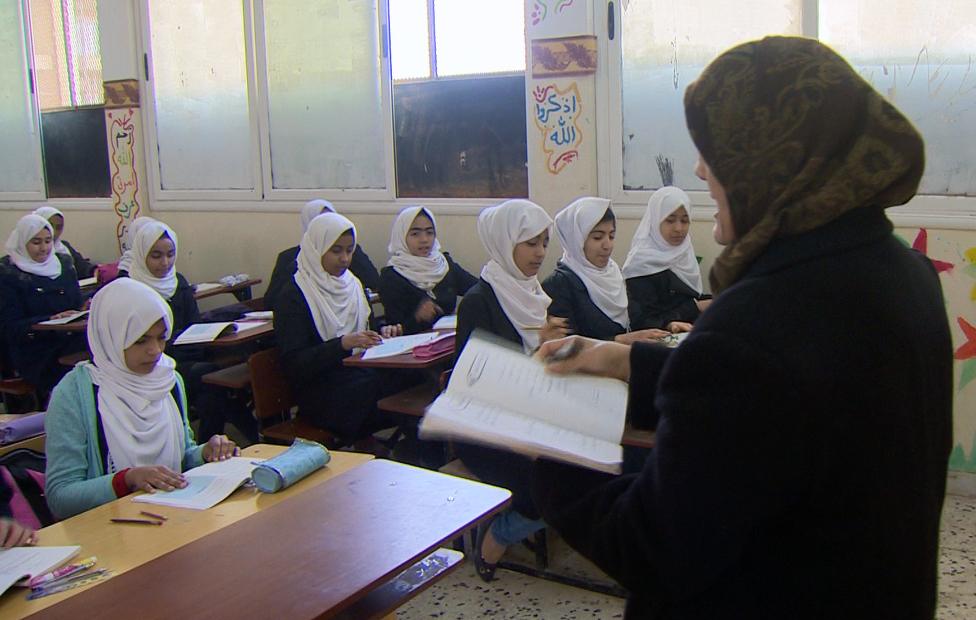The school on the front line
- Published

In one of Benghazi's poorest neighbourhoods, right on the front line of Libya's fight against the so-called Islamic State group, a brave head teacher is keeping her school open. She is determined that shelling and sniper fire will not get in the way of her pupils' education.
"I am afraid, afraid, afraid. I'm afraid that - and I hope this doesn't happen - we'll get shelled, because the mosque next to our school was hit not long ago. They fired at it while some students were on their way to Koran lessons. The first shell landed near one boy and another boy ran over to help. Then a second shell came in and blew his leg off. The first child also lost a leg. It was absolutely terrifying."
Fauzia Mukhtar Abeid has good reason to be afraid. She is the head teacher of a school in the al-Sulmani district of Benghazi, a working-class neighbourhood that, for the past two years, has been on the front line of the conflict in Libya. Less than a kilometre beyond the school playground, hiding in the ruins of bombed-out apartment blocks, are fighters from IS and other Islamist militias.

Fauzia feels it is her duty to keep teaching
The school closed its doors in May 2014, when the al-Sulmani area was engulfed in the fighting that followed the launch of Operation Dignity - a military offensive designed to clear Islamist militias from Benghazi.
The district's wealthier families quickly moved away or sent their children to private schools beyond the reach of bombs and bullets. The poorer children had no choice but to stay at home.
A year or so later, tired of watching their educational prospects drain away, some of these children and their parents began asking Fauzia if she would reopen the school.
The building had been shelled and looted, so the parents started a fund to pay for repairs. "Some families chipped in 50 dinar (about £25; $35), others 20 or five," says Hassan Omar, a member of the local council. "In the end we raised about 1,000 dinar (£500; $715) from local families and got another 3,000 (£1,500; $2,140) from the government's crisis committee."

As well as replacing the shattered glass, the workmen made a gap in the wall at the back of the school, allowing the children to reach their classrooms by a route that is more sheltered from the fighting. "There are snipers about 3km away," says Omar, "so we opened this door to avoid any problems."
The school started up again in December 2015. Electricity remains intermittent, raw sewage has pooled outside the gates, and some of the teachers have refused to return to work in a building that is still within range of Islamist militants.
But the children are determined to continue with their schooling. "No, no, we don't afraid," a girl of about 15 says in English. "We want to learn."
Walid al-Furjani, who sends three of his children to the school, agrees. "My children have been sitting at home for two years doing nothing. Of course I am worried about them, but it's important for them to study.
Many Libyans hoped that the overthrow of Col Muammar Gaddafi in 2011 would bring basic political freedoms and brighter prospects for their children. Instead, they have seen their country splinter into dozens of warring factions.
Feras Kilani, of the BBC Arabic Service, says armed forces control most of the city but are losing ground
According to the website Libya Body Count, which uses press reports to count deaths, more than 4,000 people have died in the fighting over the past two years. By some estimates there are now 2,000 separate militias in operation across Libya.
Arms dealers, jihadists, tribal warlords, and people-smugglers have thrived on the chaos. Weapons and ammunition looted from Gaddafi's arsenals have found their way across the desert to fuel Islamist insurgencies in the Sahel. In the other direction have come migrants and refugees desperate to reach Europe, as well as African jihadists bent on joining IS as it establishes a presence in Libya.
The UN estimates that there are now as many at 3,000 IS fighters in Libya. One of the districts of Benghazi in which they have gained a foothold is al-Sabri, within sight of Fauzia's school.

With her own children grown up and retirement not many years away, Fauzia did not have to return to work. But when her neighbours asked her to open the school, she says she could not refuse.
"I couldn't say no to them, to their children. I felt it was a national duty to teach these children. My conscience demanded it, even if conditions are very dangerous.
"I hope my country can find a way forward. By opening the school, we're trying to establish some kind of normality here. Despite this war, despite all the destruction, we are still keeping on. We need to live. We need a future for our country. We need peace and safety. Enough of war, enough. For the future of our children, enough."
Additional reporting by Mamdouh Akbiek and Ben Allen
Subscribe to the BBC News Magazine's email newsletter to get articles sent to your inbox.